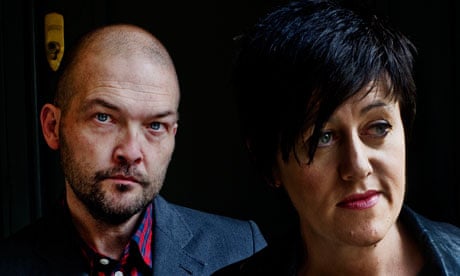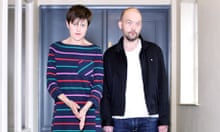If all you knew of Tracey Thorn was her music, you might think she had spent the last 30 years being squeezed through the emotional wringer. Her voice is an instrument of exquisite dolour, and her acutely observed songs dwell on relationships in their terminal phase, or in the scorched aftermath. On Everything But the Girl's 1995 hit Missing, she sang of haunting a former lover's old address, missing him "like the deserts miss the rain".
And now here she is with her third solo album, Love and Its Opposite, bearing such wrenching vignettes as Oh, the Divorces! and Singles Bar. You have to remind yourself that Thorn is half of one of the most enduring relationships in pop, with her erstwhile bandmate, now husband, Ben Watt.
"It's a parallel fantasy life, in a way," she says, over tea in a north London cafe. "Perhaps because my life has gone through phases of being quite settled, and that's not very rich subject matter, you channel other people's stories. But in a sense you can imagine yourself being there anyway. People are always only an inch away from what might have happened."
Across the table, Watt nods. His independent label, Strange Feeling, is releasing Love and Its Opposite, though the pair haven't worked together as Everything But the Girl since 1999's Temperamental album.
They were a couple before they were a band. Back in 1981, they were signed as solo artists to the indie label Cherry Red (Thorn was also a member of a trio, the Marine Girls) but had never met. When Watt attended Hull University, he heard that Thorn would be there, too, and requested a Tannoy announcement in the student bar on the first night: "Could Tracey Thorn of the Marine Girls please come up to reception now." It was one of those fateful "inches" that Thorn talks about, and here they are, still together at 47.
"I think people have an idealised sense of our life," says Thorn. "Because we've lived and worked together for so many years they think we're skipping hand-in-hand through a hedgerow. I just think, Christ, surely you can imagine that on a day-to-day level it might be a bit fraught?" Her reticent body language – she has the kind of fringe you can hide behind – belies a quick, dry wit that has made her one of the most entertaining musicians on Twitter (as is Watt, who tweets under the name of his dance label, Buzzin' Fly). The couple share not just a sense of humour, but a relaxed frankness. "To be honest, it was never easy," says Watt. "When you throw kids and family into it something has to give. You can't keep all that going at the same time. You'd go mad."
Thorn had twin daughters in 1998 (a son followed three years later) and the couple took them along on the Temperamental tour, their last. "That tour was just weird," says Thorn. "I was putting the kids to bed at the hotel then racing off to soundcheck and I remember thinking, I don't like doing both. I feel like I'm being rubbish at both. So I took a unilateral decision to stop."
For several years, Thorn was a full-time parent, not even jotting down lyrics in her notebook. She was in "a mental mush, and quite happily so. Perhaps it was a relief after years of trying to write detached, considered, intelligent analyses of people's relationships." But she came to miss singing. She wrote a memoir, which reminded her why she had started making music, though it will never see the light of day. "It's not a book because I never came up with a story. It's just like," she slips into a pub-bore drone, "this happened and then this happened . It's just a list of events of marginal interest. . . "
The memoir did at least spur Thorn on to record her first solo album in 25 years, 2007's well-received Out of the Woods – but anyone hoping to hear the new material performed live is in for a long wait. "For a few years I would say I wasn't touring because of the kids. Sometimes people would say, 'Well, you could get a nanny.' And I was like, 'Why did no one tell me there were these things called nannies?' I could be touring, obviously. I just don't want to. It's good fun when you're younger but [now] I would just be lonely and miserable." Are the duo not tempted to join the lucrative high-end nostalgia circuit and perform a classic album — their 1984 debut, Eden, for instance, or 1996's electronic rebirth, Walking Wounded — from beginning to end? "That's terribly offputting," she shudders. "I don't even want to go to those gigs, let alone perform them. I don't understand endlessly recycling the past."
Everything But the Girl were one of a wave of bands who emerged from the post-punk diaspora and found themselves in the shiny new world of 1980s pop. Their music suffered, as did their morale. "The pressures were so stupid and so uncomfortable for people of our generation," says Thorn. "We're regarded as an 80s group but many of our ideals were very 70s – good old-fashioned lefties with a do-it-yourself ethos. And suddenly the pop principles of the 80s were foisted on everyone. It seemed to me that the generation that came after us were much more frivolous."
"It was all Radio 1 A-list and MTV," Watt adds with a grimace. "I would say that period derailed many great bands: Aztec Camera, Prefab Sprout, Scritti Politti, Orange Juice. All of them battled the same thing."
Italy, they say, was the worst, because you always had to mime on TV. "Nothing could be more designed to make you feel like what you were doing was fatuous and unfulfilling," says Thorn. "You feel like a prat." Once, Watt remembers, they were pursued through Florence by fans who had mistaken them for jazz-pop fops Matt Bianco. "We were running down the street and I was shouting over my shoulder, 'We are not fucking Matt Bianco!'"
By the early 90s, the band were in a rut and bored. "I remember looking at Tracey some nights at these pin-drop-silent gigs, just thinking, I wish someone would go, 'Fuck off!'" says Watt. They were jolted by a seismic upheaval: Watt's near-fatal struggle with a rare auto-immune disease, Churg-Strauss syndrome, which he documented in his 1996 memoir, Patient. "How you change without an extreme event intervening is tricky," says Thorn. "It forced a break and sent you a bit nutty for a year." She regards Watt fondly. "In a good way. Positively nutty."
Following Watt's full recovery, the duo took a new electronic direction. Massive Attack asked Thorn to guest on their Protection album, while New York DJ Todd Terry turned Missing from a wee-hours ballad into a global dancefloor smash. Walking Wounded, a masterpiece of dance-savvy melancholia, became their biggest-selling album, leading to Watt's current career as a DJ, promoter and label boss. "The dancefloor never lies; there's a meritocracy. I love the dance scene for those qualities."
Watt's father was jazz bandleader Tommy Watt, so he understands the ambivalent relationship his own children have with their parents' music. "You have to let your kids come to you and take what they want," he says. "It's almost deliberate the extent to which they blank it out," says Thorn, "because it isn't what they want their mum to be." There's a wonderfully moving song on the new album – which is sparser and less electronic than Out of The Woods and the last two Everything But The Girl records – about parenthood and growing older, called Hormones: "Yours are just kicking in, mine are just checking out." "They have listened to it," says Thorn, "but whether they've paid any attention to what it's about I have no idea."
Another new song, the gentle, country-flavoured Long White Dress, was written a while back, but has come back to haunt Thirn because it's about fear of marriage; she and Watt tied the knot last year at Chelsea register office. "Now everybody's throwing it at me: explain yourself, woman! I can't really explain myself. It's all a bit irrational, to be honest."
Why did they marry after 28 years? The question seems to ruffle their natural sense of privacy and they respond with a joke. "It was largely our accountant's idea," says Watt. "We call him Cupid."
"I think we misunderstood him and didn't have to be married at all," says Thorn. She shoots her husband another fond glance. "We should get divorced, shouldn't we?"
Love and Its Opposite is out now on Strange Feeling.





